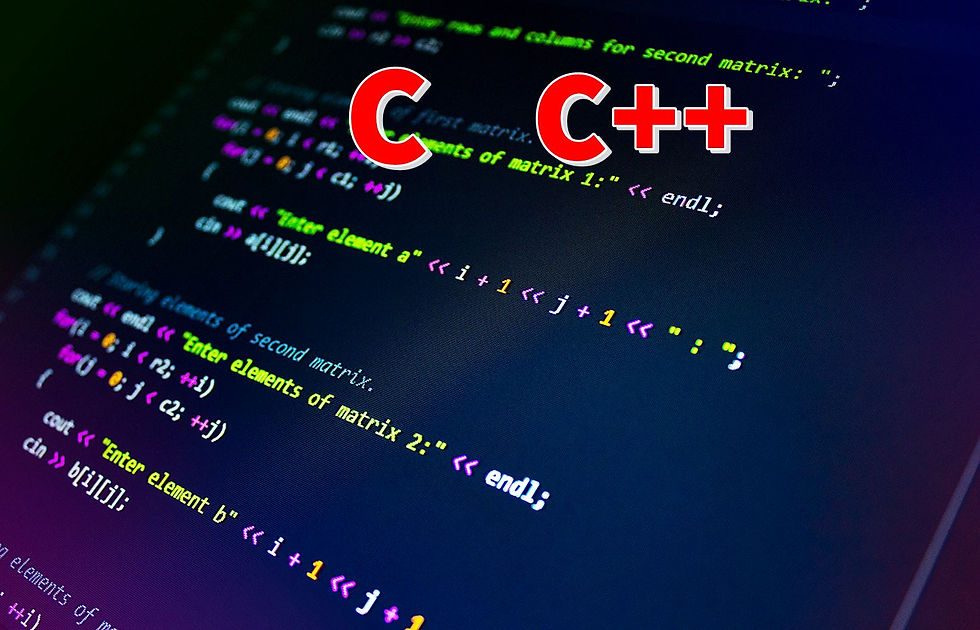C and C++ Programming; Powering Software Innovation
- Kalyan Bhattacharjee
- Jul 22, 2023
- 3 min read
Updated: Jan 9

C and C++ | Exploring the Powerful Duo of Programming Languages
Introduction
Programming languages are the building blocks of the digital world, enabling developers to craft robust and efficient software solutions. Among the plethora of programming languages available, C and C++ stand tall as two of the most influential and versatile options. C, the ancestor of many modern programming languages, and C++, its powerful successor, have left an indelible mark on the software development landscape. In this blog, we will explore the unique features and applications of these languages, highlighting their importance in various domains.
C: The Foundation of Modern Programming
Created by Dennis Ritchie in the early 1970s, C was developed to provide a flexible and efficient language for programming computer systems. C's impact on the industry has been monumental, as it served as the foundation for numerous programming languages, including C++, Java, and Python. One of the key features that set C apart is its low-level memory access, allowing developers to manipulate memory directly, making it ideal for system and hardware-level programming.
Another defining aspect of C is its minimalistic design. With a simple set of keywords and a compact syntax, C is both easy to learn and efficient in terms of execution speed. Its popularity stems from its use in developing operating systems, embedded systems, device drivers, and other performance-critical applications.
C++ The Power of Object-Oriented Programming
In the early 1980s, Bjarne Stroustrup extended the capabilities of C and introduced C++, bringing the paradigm of object-oriented programming (OOP) to the world of C. This evolution combined the efficiency of C with powerful OOP features like classes, inheritance, and polymorphism, providing developers with a higher level of abstraction and better code organization.
The introduction of classes in C++ revolutionized software development, enabling developers to create reusable, modular code. Encapsulation allowed data hiding, leading to more secure programs, and inheritance facilitated the creation of hierarchies of related objects, making code maintenance and extension more manageable.
Furthermore, C++ introduced operator overloading, allowing developers to define custom behaviors for operators like "+," "-", "*", and more. This feature simplified code expression and readability, enhancing the language's expressiveness.
Applications of C and C++
C and C++ have found widespread use in various domains due to their unique strengths.
Systems Programming: C's direct memory access and low-level features make it ideal for developing operating systems, device drivers, and other system software.
Embedded Systems: C's lightweight nature and efficient memory usage make it a top choice for embedded systems programming, where resources are limited, and performance is crucial.
Game Development: C++ has become a dominant language in the game development industry due to its ability to handle complex graphics rendering, physics simulations, and real-time performance.
Application Development: C++ is often used to develop high-performance desktop applications and productivity software.
Performance-Critical Applications: Both C and C++ are preferred for applications that demand high efficiency, such as real-time simulations, scientific computing, and video processing.
Networking: C and C++ are widely used in network programming, where low-level control over network protocols is essential.
C and C++ continue to play pivotal roles in the world of software development, proving their value across various domains.
While C serves as the foundation for numerous languages and remains unparalleled for low-level programming and hardware interaction, C++ builds upon C's strengths and introduces the power of object-oriented programming.
The influence of C and C++ extends far beyond their creation, shaping the way developers approach problem-solving and software design. Whether it's developing system software, crafting real-time simulations, or creating high-performance applications, C and C++ have earned their place as essential tools in the programmer's arsenal.

Conclusion
As technology evolves, these languages will likely continue to be vital components of the software development landscape, inspiring new generations of programmers and contributing to the advancement of technology for years to come. Embracing the dynamic duo of C and C++, developers can unlock endless possibilities and create software solutions that stand the test of time.
c++, c and c++ difference, c and c++, what is c and c++, is c and c++ same, c++ compiler, visual c++, learn c++, c++ tutorial, c++ programming, dev c++, programming language, python, coding, embedded systems, software, applications, app development

Comentarios